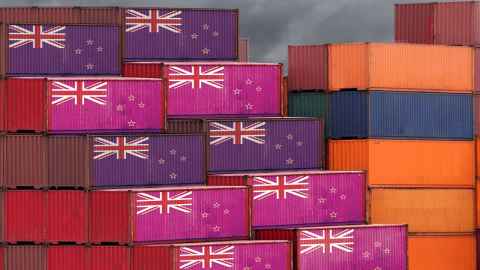Global thinkers to talk trade in Auckland
4 September 2019
Opinion: Insight into disruptions facing trade policy will be shared by international experts at a Public Policy Institute event this week, writes Rob Scollay.

Disruptions challenging modern international trade policy are intensifying in force rather than diminishing.
Trade wars and challenges to longstanding international trade rules are spreading against a background of further disruptions heralded by an accelerating avalanche of breakthroughs in fields such as artificial intelligence and machine learning, robotics, the Internet of Things, autonomous vehicles, 3D printing, nanotechnology, biotechnology, materials science, energy storage, and quantum computing.
Insights and understandings on the profound disruptions facing trade policy today, and how a country like New Zealand can respond, will be shared by high-quality international experts at the inaugural Auckland Trade and Economic Policy School on September 6-7 at the Fale Pasifika, on the university main campus.
This two-day event, Disruptions and Disruptors, is organised and hosted by the University of Auckland’s Public Policy Institute and will be opened by Trade and Export Growth Minister, the Hon David Parker.
The challenges to trade and economic policies run deep. New technologies like machine learning, translation software, and workplace ‘telepresence’ will dramatically expand and speed up the exchange of services and skills across international borders, creating exciting new opportunities for individuals and businesses. At the same time, those technologies will change the nature of tasks performed by white-collar and blue-collar workers alike. Governments and communities will be challenged to develop new rules, policies and norms that recognise the imperatives of competitiveness, predictability and trust in international relationships, and social inclusion at home, all in a complex and ever-changing environment.
Previously agreed rules, norms and processes for the governance of international trade - which New Zealand and many other countries have relied upon as a stable and dependable framework to pursue our international trading interests - are being challenged today in ways that until very recently would not have been believed possible. Ignoring the lessons of history, a destructive trade war is being waged, in which the existing framework of trade rules and norms is being treated with disdain by the country that played the leading role in creating the framework in the first place.
The trade war presents a further challenge for New Zealand, as for many countries in our region, in that the protagonists in the trade war are two of our most important trade and economic partners, raising the unwelcome prospect of efforts to force us to take sides in the conflict, leading inevitably to significant damage to our trade and economic interests, as well as threats to our overall security as a nation.
Previously agreed rules, norms and processes for the governance of international trade - which New Zealand and many other countries have relied upon as a stable and dependable framework to pursue our international trading interests - are being challenged today in ways that until very recently would not have been believed possible.
Governments and the international trade policy community are engaged in an urgent search for ways to preserve the elements of a rules-based international trade and economic order that underpinned the unprecedented expansion of trade, economic growth and incomes of recent decades. Newly emergent trade and economic powerhouses, most notably China, will inevitably have a vital influence on what happens next. Seeking a basis for sustaining a viable and effective WTO, with the ability to adapt its rules to changes in the international trade environment, and a reliable and respected process for the settlement of trade disputes, is a first priority. Newly-developed and developing plurilateral arrangements, such as the Comprehensive and Progressive Trans-Pacific Partnership (CPTPP) and the Regional Comprehensive Economic Partnership (RCEP), may have an important role to play in sustaining a rules-based approach to international trade.
The unbundling of global production in international production networks and global value chains has already transformed international trade, investment and production patterns. Further transformation is promised by both trade wars and new technological developments. New Zealand businesses will need to anticipate, understand and adapt to these changes.
The services sectors comprise by far the largest part of the New Zealand economy, as in many other economies, and make a critical contribution to the efficiency of our economy. Services provide new trading opportunities for New Zealand businesses, and also contribute essential value added to primary and manufactured exports, ensuring their quality and international competitiveness. Trade in services has a vital role in providing competition, technological development, and management innovation in our services sectors, enhancing their capacity to contribute positively to our economic and trade performance. Efficient and competitive services are also critical to realising the full potential benefits of the digital economy. Remarkably, international services trade remains heavily restricted, highlighting the need for the international trading community to find new ways of making progress in this important area of trade.
Digital trade has the potential to dramatically increase the benefits of international commerce, but achieving an agreed framework for realising this potential is one of the most difficult challenges facing the international trading community. The debates and conflicts currently raging over the regulation of digital trade and the digital economy have the potential to produce outcomes ranging from the enhancement of human wellbeing across the planet to a costly nightmare of fragmented and socially maladapted digital trading systems.
Governments in New Zealand and elsewhere face the challenge of navigating these disruptions while also developing and implementing policy frameworks that promote both trade and much-needed social inclusion.
Dr Rob Scollay is Director of the New Zealand APEC Study Centre and Associate Professor in Economics at the University of Auckland.
This article reflects the opinion of the author and not necessarily the views of the University of Auckland.
Used with permission from Newsroom Global thinkers to talk trade in Auckland on 4 September 2019.
Media queries
Alison Sims | Research Communications Editor
DDI 09 923 4953
Mob 021 249 0089
Email alison.sims@auckland.ac.nz